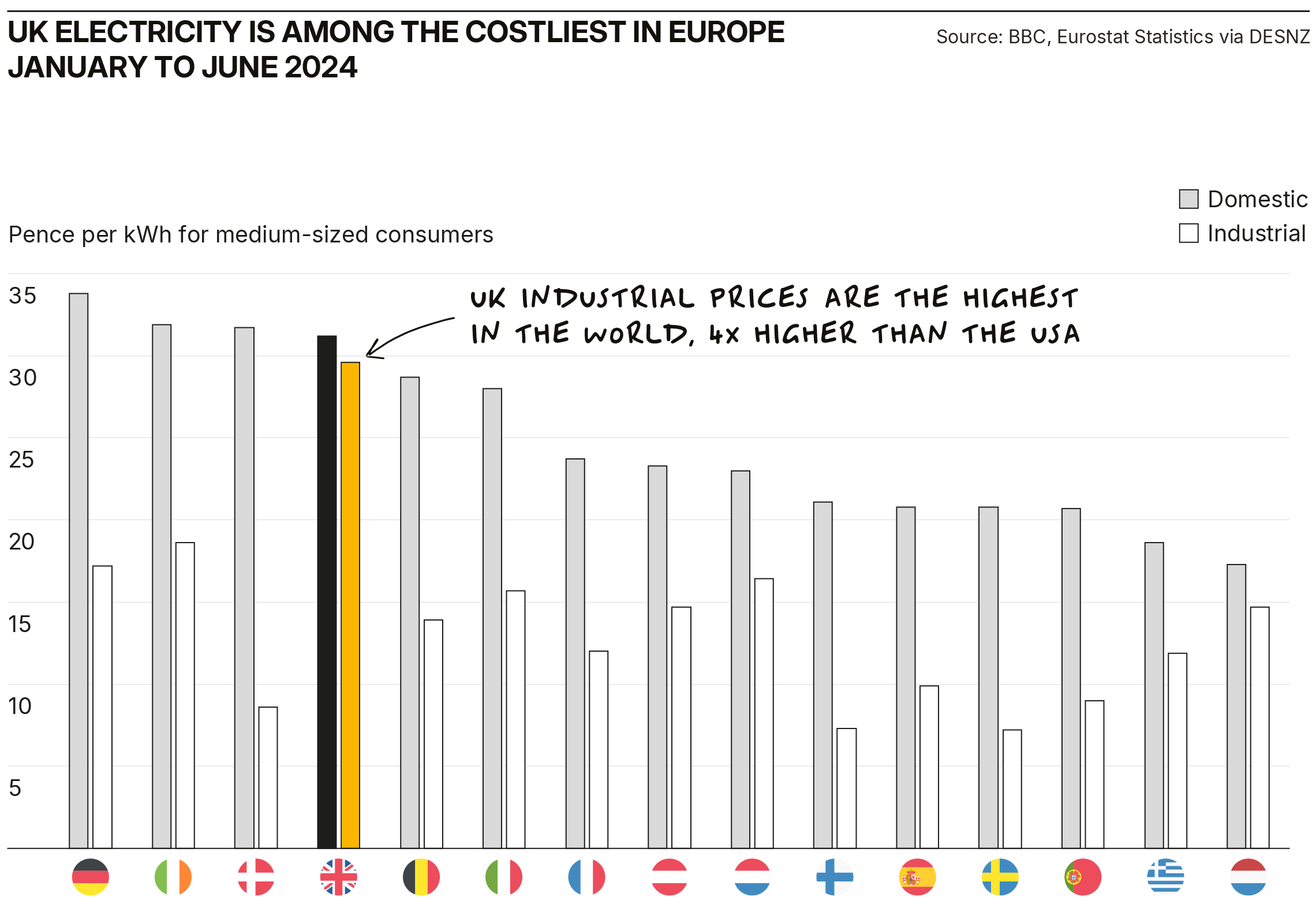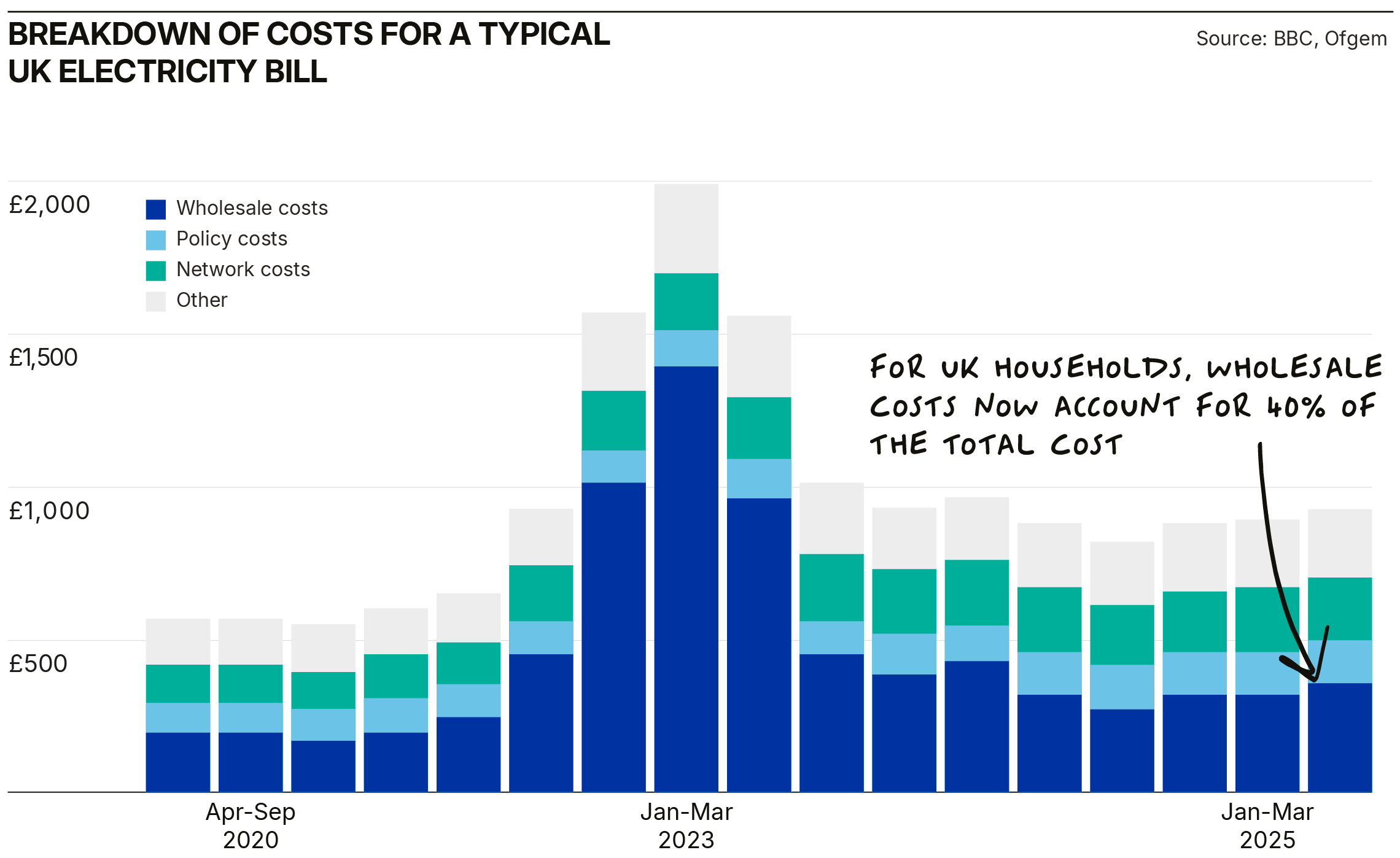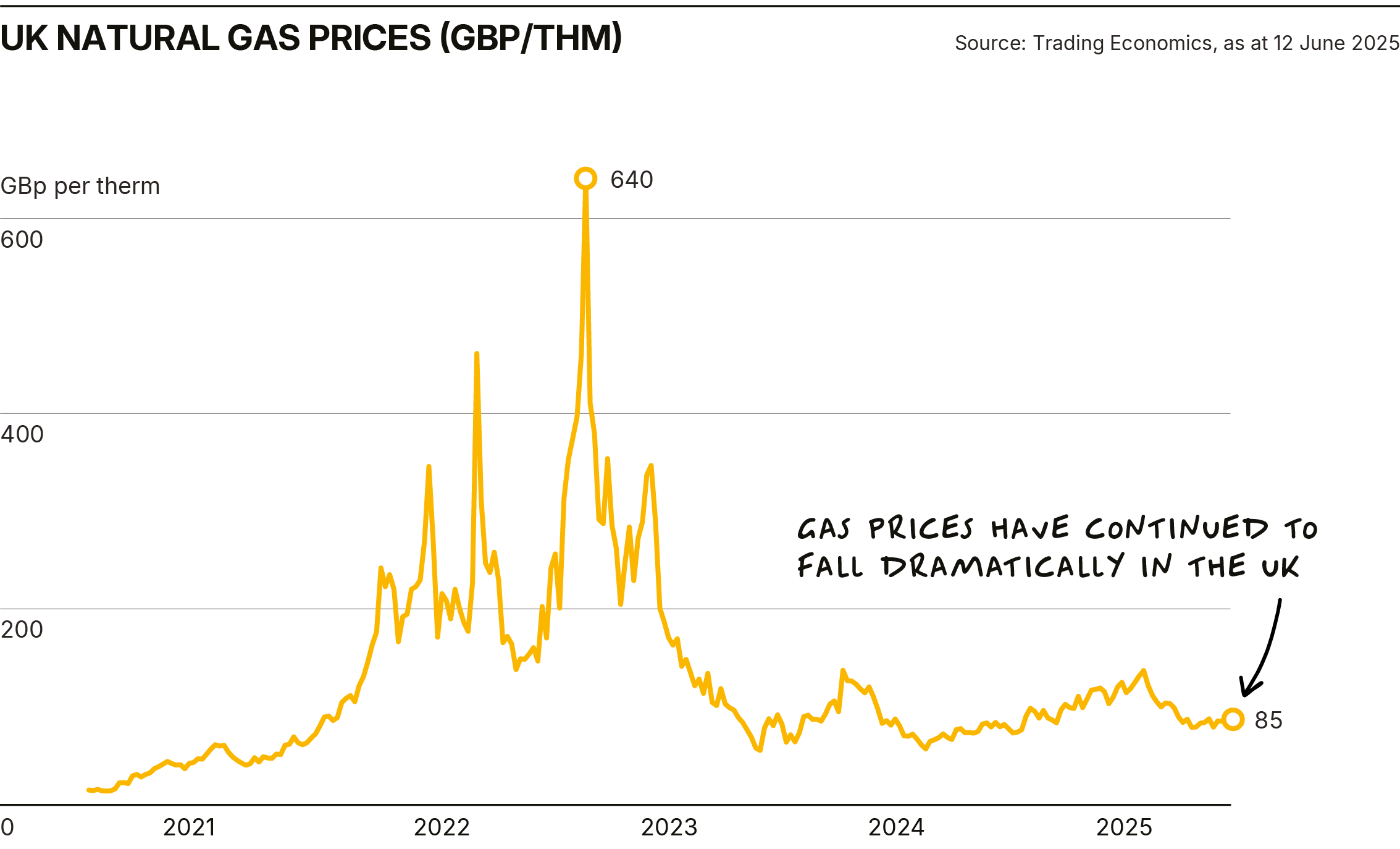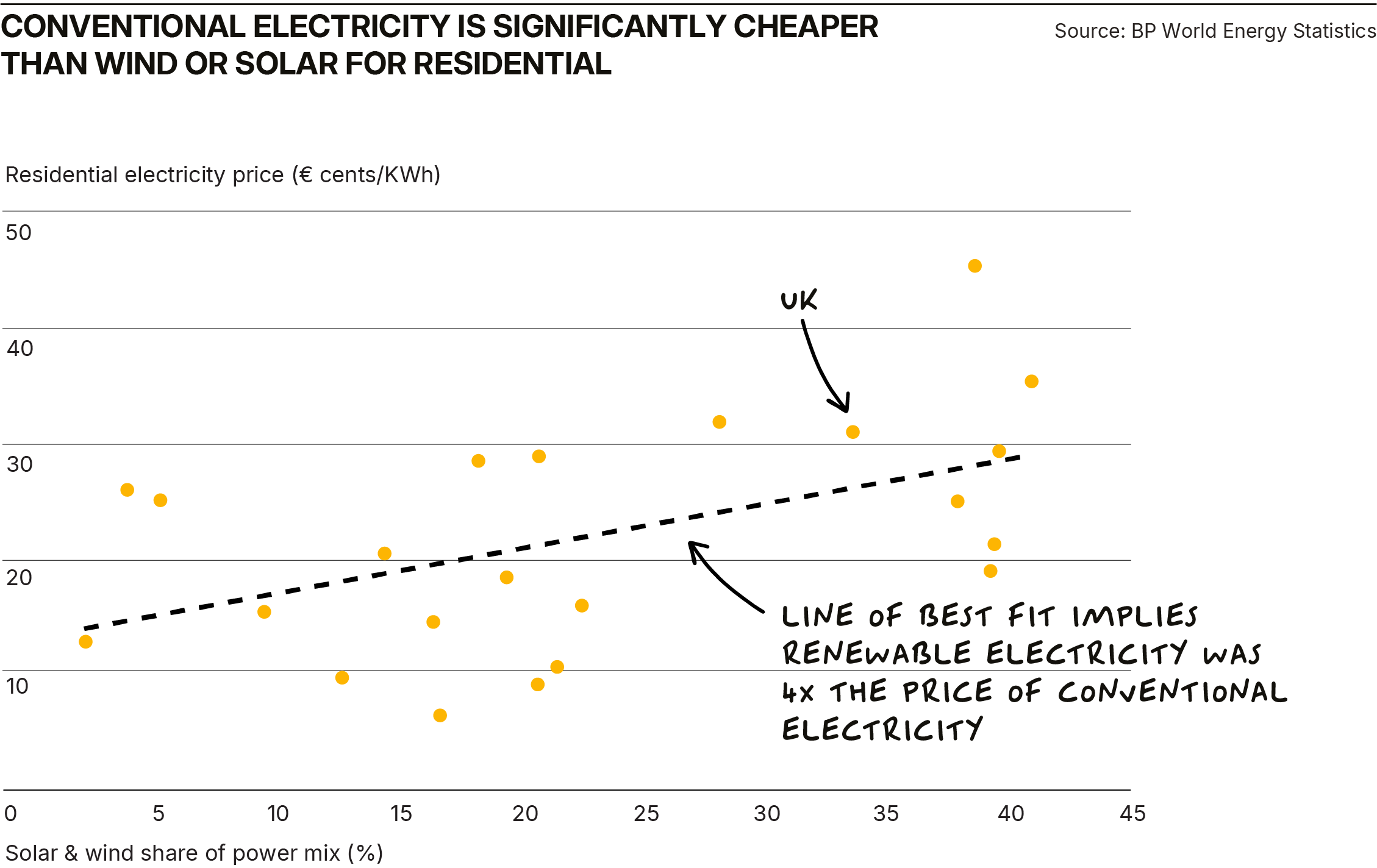
Big beautiful (electricity) bill
Lies, damned lies and statistics
This phrase, popularised by Mark Twain, immediately came to mind when I listened to a recent interview with Ed Miliband, the UK’s Secretary of State for Energy Security and Net Zero. The Secretary of State’s responses to a couple of the interviewer’s questions about why UK energy prices were so high catalysed this particular blog.
In summary, in response to the interviewer’s suggestion that high UK energy prices were in part a product of the very high tax rate suffered by UK energy businesses, (78%) the Secretary of State said that high UK energy prices were the direct product of a combination of the UK’s dependence on imported fossil fuels and impact of the war in Ukraine and had nothing to do with the level of taxation levied on energy businesses in the UK. He then went on to proclaim that the UK’s accelerated push towards net zero and a carbon-free energy economy would, apart from delivering lower household bills, end, once and for all, our dependence on global energy prices and their inherent volatility.
The point of this note is not to debate the origins of the changing climate but to try to present the economic arguments that different policy choices present to us all. My issue with UK politicians is that they have never been straight with the electorate about the implications of their absolutist energy policy choices on our behalf. This is especially pertinent because the current UK government’s energy policy, crafted by Mr. Miliband, is designed to accelerate the UK economy’s rush to net zero.
Of particular relevance to this policy choice is what Tony Blair, Mr Miliband’s old boss, said at the end of last month in a speech on the back of a recently published paper authored by the Tony Blair Institute. In it, the Institute argues that the current policy approach isn’t working and that a strategy based on phasing out fossil fuels or limiting their consumption globally is doomed to fail. It goes on to advocate a different policy approach focused on accelerating the viability and commercial application of innovative technologies like carbon capture and storage, nuclear fusion, nature-based solutions (my particular favourite) and in the immediate future, a greater reliance on nuclear fission and especially modular nuclear reactors.
I don’t agree with everything in the paper, but it’s a really interesting new perspective on what has become, as Tony Blair describes it, an irrational and hysterical debate in which anyone who voices opposition to established thinking is branded “climate deniers.”
UK policy choices
The current UK government’s energy policy is designed to drive the economy to net-zero emissions by 2050, with a significant milestone of achieving clean power by 2030. That means the UK will aim to have a clean power system by 2030, which involves phasing out fossil fuels from electricity generation by that year (at least 95% coming from low-carbon sources and no more than 5% from unabated gas). Alongside this energy policy, the government also plans to ban sales of new ICE cars by 2030 and hybrid sales by 2035.
Clearly, this is an incredibly ambitious agenda, and although some other European nations have similar targets, I can find none globally that are going this hard and this fast at a clean energy transition.
To encourage the sort of investment that is required to deliver this goal, significant incentives are provided to solar and wind developers in the form of guaranteed prices for 15 years alongside high guaranteed prices for new nuclear developments like those at Hinkley Point in Somerset. Of course, there are additional costs as the energy system shifts to more renewable generation. These costs include new grid connections and upgrades to cope with the intermittency of renewable generation. There are also costs associated with the need to have backup fossil fuel generation to power the grid when the wind doesn’t blow, and the sun isn’t shining and ultimately the need to invest in significant energy storage so that renewable energy can be stored when it isn’t being used. This is all costly stuff, but it all has to be paid for by UK electricity consumers, both industrial and household.
These charges are, by design, levied through bills to fund the incentives that the government guarantees to the companies developing wind, solar and new nuclear developments. One example would be the 35-year price guarantee EDF was given for the electricity produced from Hinkley Point C. It isn’t producing electricity yet, but the deal's structure makes the point. The guaranteed price, by the way, is approximately 50% above the prevailing price (a guaranteed real price).
Before looking at the veracity of Mr. Miliband’s statement in his interview, I just wanted to present some data that puts the UK’s electricity prices in an international context. I have used several charts in the past on this subject, but I found some new ones in a BBC article with data from Eurostat Statistics. The points I want to make address two similar ones linked together by Mr. Miliband. The first deals with the actual level of electricity prices in the UK, and the point he made about them being the product of high fossil fuel prices, and the second deals with the issue of the volatility of these prices.
Prices

I suppose the first point to make is that the UK household price is the fourth highest in Europe and, from what I can see, the fourth highest in the world. The industrial price is an eye-watering 72% higher than in Germany, nearly twice the price in Italy and 2.5x the price in France. It is also, by some margin, the highest in the world and something like 4x the price in the US.
So, why are UK electricity prices so much higher than in Europe and the US? According to the Energy Secretary, it’s because of fossil fuel prices, and more accurately, the gas price. But can this be true? Gas is a globally traded commodity, via LNG cargoes and pipelines. The UK does not need to pay much higher gas prices than Germany, for example, to secure the gas we need in this country. (Gas sets the wholesale price of electricity in the UK energy market just as it does in Germany, the US and in most of our peer economies)
The fact is that Mr Miliband is either ignorant or not being straight with the public about the reasons why electricity prices are so high in the UK. I am confident that the price Centrica pays, for example, to buy gas in international markets is broadly similar to the price other European utility companies are paying. In other words, the UK’s ludicrously high industrial electricity prices cannot be caused by the gas price. The causes must lie elsewhere in the arcane structure of the UK’s electricity market.
In my internet research for this blog, I looked for an accurate analysis of why UK electricity prices are so high. I found a mountain of guff that, like Mr Miliband, pointed the finger at the UK’s dependence on imported gas. But I also found that Germany, whose industrial electricity price is 58% of the price in the UK, imports 94% of its gas from other countries. Italy imports 92% of its gas needs, yet has an industrial electricity price approximately half that of the UK. In other words, this default explanation for high UK electricity prices is just not true.
Here is some further background evidence which I think supports what I am saying. Shown below is another chart from the BBC article I mentioned earlier. It shows that back in the period after Russia invaded Ukraine in February 2022, gas prices increased significantly. During this period, it is true that the huge increase in the price of gas drove up UK household electricity bills. (wholesale costs)
But now that gas prices have returned to a more normal level, the data in the chart shows that for UK households, wholesale costs, which are effectively set by the gas price, account for (see the far-right hand bar on the chart below) approximately 40% of the total costs. Policy costs, network costs, and other (whatever they are) account for the remaining roughly 60%.

The chart below shows that gas prices have continued to fall dramatically in the UK. If Mr Miliband’s assertion that UK electricity prices were driven by volatility in fossil fuel prices is true, then clearly, UK electricity prices should have collapsed just as the gas price has.

Maybe not surprisingly, I have not been able to find a chart of UK industrial electricity prices. However, I did find some data on the UK Government’s data service compiled by DESNZ, which compares industrial energy prices by customer size across the EU and G7 using data supplied by Eurostat and the IEA.
This data shows that UK industrial electricity prices increased from 8.93p to 25.46p (excluding taxes) over a 10-year period to 2023—a 2.9x increase. Between 2016 and 2024, UK industrial electricity prices went up 331%. Over the same period, gas prices increased by approximately 76%.
You do not have to be a statistical genius to see that Mr Miliband’s assertion that high fossil fuel prices are the only cause of high UK electricity prices cannot be true.
The truth is that gas price volatility influences electricity prices in the UK as it does across many other similar developed economies. But it is not the explanatory factor the government wants us to believe for the astronomically high electricity prices in the UK. Other factors have inflated these costs, which the government appears unwilling to be open about.
I also found a consistent message: that renewable electricity is very cheap and that a renewable-dominated energy system will deliver much cheaper electricity than one dominated by fossil fuels. But then, if that were true, why do countries with the highest dependence on renewables have the highest electricity prices? And why does the UK, with one of the highest contributions from renewables in the world, not have much lower prices?

I haven't researched this question fully, but I think a number of clear observations can be made up front.
- The standard explanation for why UK electricity prices are among the world’s highest cannot be true.
- The widely held view that renewables deliver much cheaper electricity than fossil fuel-generated electricity is not supported by anecdotal evidence, which shows that those economies with the highest dependence on renewables have the highest electricity prices.
- It may be possible that the hidden costs of transitioning to a renewable energy system are the explanation (grid investment/upgrades, new connections, back-up fossil fuel generation to cover intermittency, electricity storage infrastructure, etc.). But if this is true, why cannot our policymakers be open about it?
- The UK’s pursuit of a renewables-dominated energy infrastructure will continue to be accompanied by the highest industrial electricity prices in the world. This will eventually drive every energy-intensive business in the UK to relocate to other countries. Not to do so would be to commit economic suicide. This significant and hidden cost of the transition to net zero is one no policymaker has ever been honest about here in the UK.
Volatility
Whilst it is true that global energy prices (oil and gas) are volatile and that Russia’s invasion of Ukraine drove up the price of gas across Europe, it is not true that an energy system dependent on renewable generation would not also see volatility in prices. For example, imagine a cold, gloomy winter’s day, or worse, a fortnight, in the UK underneath a high-pressure weather system. In these circumstances, the UK’s renewable energy fleet would generate close to no electricity. As we were back in January this year, we would be entirely dependent on electricity imports via interconnectors and gas-fired stand-by generation. In these circumstances, assuming we could access what we needed via those international grid connections (these are not guaranteed), the electricity price would be incredibly volatile to incentivise the marginal gas-fired capacity to come on stream.
Also, the UK’s unilateral rush to net zero will continue to rely on the “kindness of strangers”. If all our European peers were pursuing the same net-zero strategy, there would be no surplus generation that we could tap into when we were generating little or no renewable energy. This would require the UK to invest in much more standby gas-fired capacity, significantly more energy storage capacity, or much more nuclear generation. One way or another, this would require a massive increase in upfront investment, more cost, and even higher bills. In other words, our current energy strategy depends on our neighbour economies retaining fossil fuel generation capacity to bail us out when we are in trouble. Very odd.
It is also the case that what happened in Spain recently, which endured Europe’s biggest blackout in twenty years, may have been caused by technical factors linked to its dependence on renewable generation. Again, aside from the structural problems in Spain’s energy infrastructure which will need to be resolved to ensure this doesn’t happen again, what this incident highlights are the potential vulnerabilities of renewable energy dependent systems which will require investment to mitigate, and which hitherto have not been budgeted for nor implemented.
Conclusions
- The UK’s unilateral headlong rush to net zero has created costs and vulnerabilities in our energy infrastructure, which have had important and far-reaching economic implications. No one in government seems prepared to confront these honestly. If we continue on this path, or even accelerate as Mr. Miliband suggests, those costs and vulnerabilities will become more challenging. A clear implication of this policy is that all energy-intensive industries will have to find more favourable economies in which to operate. This includes not only steel, aluminium, and cement but also new high-growth sectors like AI and data centres.
- Some traditional supporters of this energy policy, like Tony Blair, now seem to be waking up to the huge risks and impracticalities of removing all fossil fuels from the energy mix. However, the UK’s energy secretary is still deaf to these legitimate concerns and seems intent on driving the UK economy into a structurally disadvantaged and vulnerable position, which can only weaken its competitive position.
- The widely held consensus on the causes of high UK energy prices is plainly wrong. It appears that the one-eyed, “hysterical” debate about climate change and its causes has eradicated any objectivity about the causes of high UK energy prices.
- The UK electorate has never been presented with a clear and honest presentation of the costs and benefits of net zero. Those driving this unilateral policy fail to recognise that its damaging consequences will eventually seed growing resentment and a huge backlash, which can only undermine legitimate concerns about mankind’s impact on the world’s fragile environment.
This post was prompted by an interview with Ed Miliband, the UK’s Secretary of State for Energy Security and Net Zero. He claimed that UK electricity prices are high because of imported fossil fuels and the war in Ukraine—and that the push to net zero will deliver lower bills and end price volatility.
But this just doesn’t add up.
UK household energy bills are the fourth highest in the world. Industrial electricity prices are even worse—72% higher than Germany, 2x Italy, 2.5x France, and 4x the US. Gas is a global commodity, so UK buyers like Centrica pay similar prices to their European peers. Yet other gas-dependent nations like Germany and Italy have much cheaper electricity. So clearly, imported gas prices can’t be the cause.
What is pushing prices up? The UK government’s energy policy. It’s full of long-term price guarantees to wind, solar and nuclear developers, paid for directly through our bills. These contracts, like the 35-year deal with EDF for Hinkley Point C at 50% above market price, bake in high costs. Add to that the massive spending required for grid upgrades, storage, and backup generation, and it’s no wonder prices are so high. Yet none of this is being explained honestly to the public.
The same applies to volatility. Yes, fossil fuel prices fluctuate. But so does renewable output. In winter, under still high-pressure systems, renewables can produce close to zero. At that point, we’re dependent on imported electricity and standby gas power—both expensive and unreliable. And that assumes other countries have spare power to export, which they may not if they’re on the same net-zero trajectory.
Tony Blair’s institute recently published a paper criticising the current “ban fossil fuels” approach as doomed to fail. It recommends focusing instead on innovation: modular nuclear, carbon capture, nature-based solutions. While I don’t agree with every word, it’s refreshing to hear a less hysterical, more practical voice.
Ultimately, this debate has become so one-eyed that honest questioning is branded denialism. But someone needs to say it: the transition to net zero has real costs and consequences, and the UK government hasn’t been upfront about them. High electricity prices are damaging our economy and will drive energy-intensive industries offshore. We’re pursuing an ambitious policy with no honest public discussion of its trade-offs—and if we don’t face up to that, we risk economic decline and public backlash.
To be clear, I’m not against renewables. I’m against bad thinking and the kind of policy-making that hides real costs behind political slogans. At W4.0, I focus on the real opportunities, not the wishful ones. The Unstoppable Trends strategy includes a number of renewable energy businesses I’ve screened and selected because they’re solving real problems with real technology and they look significantly undervalued given the scale of the transition ahead.
Woodford Views subscriber exclusive
W4.0 was created to give direct access Neil Woodford's investment strategies, and the thinking behind them.
This blog highlights exactly why that matters: policy failure creates market distortion — and within that, opportunity.
Neil’s latest strategies — including Unstoppable Trends — are now live and available to explore.
Related posts
Introducing W4.0
Direct access to Neil Woodford’s proven investment strategies.

Subscribe to receive Woodford Views in your Inbox
Subscribe for insightful analysis that breaks free from mainstream narratives.
